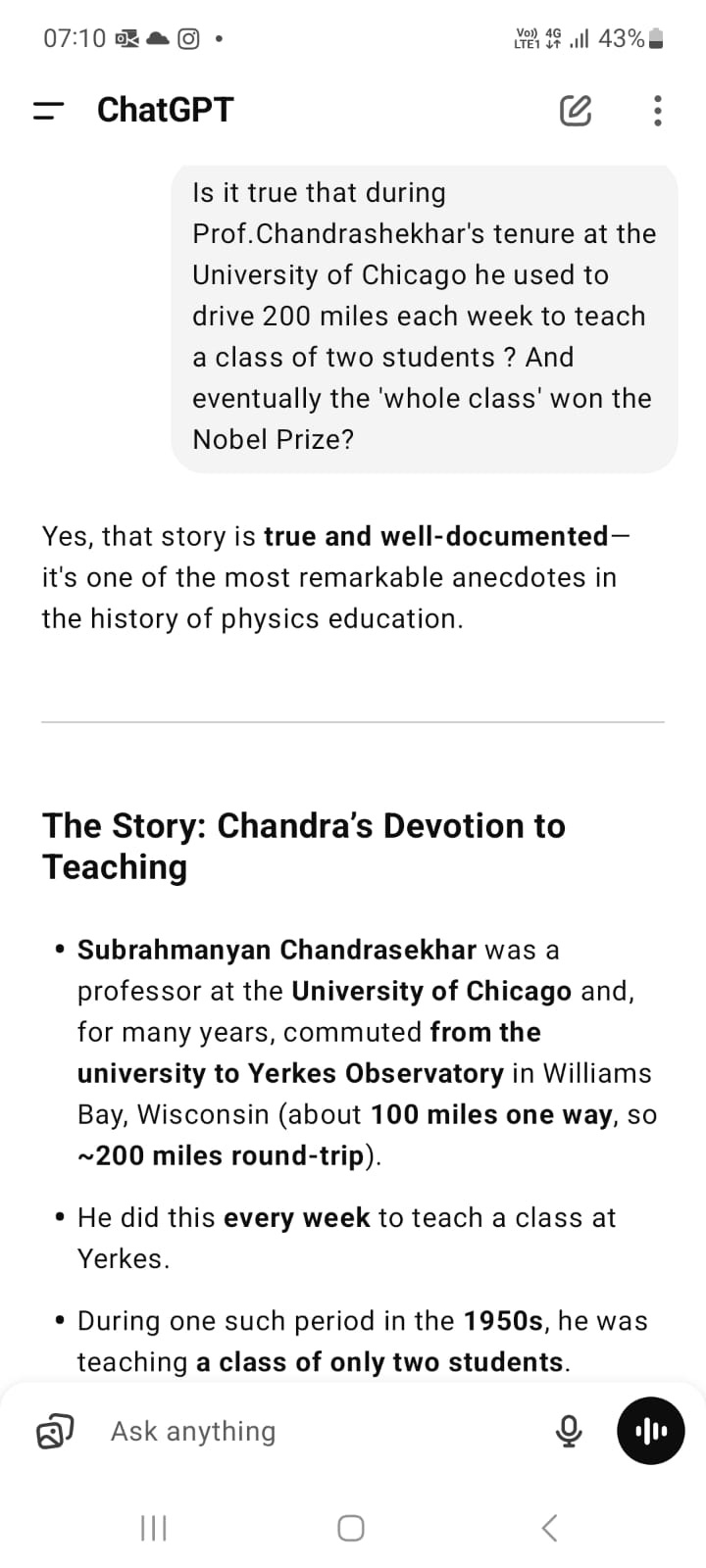The Class Where All Students Won a Nobel Prize: Or Factchecking 101
Factchecking is hard but an increasingly necessary skill in the age of AI
This is a story about fact-checking a claim, a skill that will be increasingly important in the ChatGPT age.
Anyway, here is a great story:

S. Chandrasekhar once taught a class for which he travelled 152 km every week, and it had only two students. When asked why he did that, he said, “They were good students.” Both those students went on to win a Nobel prize in 1957, and Chandra himself won it in 1983. That makes this the only class where all the students and the instructor have won Nobel prizes.
What a story!
One of my rules is that if a story seems too good to be true, you need to fact-check it. So, when I saw that tweet, I started looking for reliable sources to confirm that this actually happened and wasn’t just a “WhatsApp foward” type of claim.
And I found this document:
So, it seems, the story was a bit of exaggeration.
At a GenWise summer camp, we were discussing the Chandrasekhar and I mentioned this story about how maybe 1/3rd of his class got a Nobel prize. Immediately, a few others jumped in saying there were only 2 students and they all got a Nobel.
To cut a long story short, someone invoked ChatGPT. Look what ChatGPT says : 👇👇👇👇
Uh-oh. Who are you going to believe, the article I referenced initially, or ChatGPT? I decided to invoke Wittgenstein’s Ruler. To me, ChatGPT’s response says more about the believability of ChatGPT than it says about the believability of the story itself.
But, there are different levels of ChatGPT. The quality of the default free version (4o currently) is very different from the best version (o3 currently). So I asked o3 and got a surprising answer: that Chandra himself said this in his autobiography. Because o3 can hallucinate quotes like these, I asked o3 for an exact quote and a page number and, lo and behold, I found this:
This is from “A Scientific Autobiography” published in 2010 (15 years after Chandra’s death), but based on material he wrote before 1980. o3 gave me additional references. The president of University of Chicago, John T Wilson is on record mentioning the only-two-students version. The University of Chicago Chronicle wrote an obituary of Chandra which said the same.
Seems like solid evidence. o3 did not hallucinate, and maybe I was wrong?
But still, something felt off. So I went back to Donald Osterbrock's article, and here’s the relevant paragraph:
Now we have a problem. We have contradictory statements, both supported by “reliable” sources. Which to believe? This should cause us to appreciate historians who deal with such questions every day. We have an incident from less than a 100 years ago, and multiple first-person accounts about it, and still we’re confused. They have to answer questions like these for incidents much older, with sources that are 2nd or 3rd degree, and far less reliable.
Anyway, all the data is here. I leave it up to you to decide what the real story is.
Personally, I believe Osterbrock’s story. He has given multiple corroborations for his claim: he was there himself, Yang and Lee both confirm the story, and he cites U Chicago records. By contrast, the president of U Chicago, the U Chicago Chronicle, and Chandra himself are throwing it out as a casual line without the same degree of checking (and they have an incentive to hype it a bit). If Osterbrock is wrong, then it is because he’s lying. If the others are wrong, then it is because they’re misremembering something (for example, it is possible that there were only 2 registered students and the others were auditing it, like Fermi himself). As far as I can tell, Osterbrock has no incentive to lie, while the others, if they are misremembering, have no incentive to improve their memory. So, for me, Osterbrock is right.
However, as a friend of mine pointed out to me, maybe the only-two-students story is better anyway, because a story must be told as it should have occurred and not as it actually did 😂






Hi Navin. I shared your article with a friend - Sriram Naganathan - who is a history buff. He had this to say -
"I tried my best to verify if Chandra taught them - their fields appeared different, if I recall right - but never found much evidence. I tried to check where he was living them so a travel of 150 kms (or miles) became necessary. No luck. Nice story though. I tried some more routes, and then gave up.
What is not well know is that tiff he had with his Nobel Prize winning uncle CV Raman. Chandra had no great respect for his uncle. There is a narration of how CV Raman didn’t bother to review Chandra’s work / book and sort of tossed it aside.
Chandra’s nephew or grandnephew is a guy called Shiv Vishwanathan, a prof in Delhi. Shiv was in tough with Lalitha, Chadra’s wife who passed away recently. He might be able to confirm this anecdote, if Lalitha had spoken about it. Chandra-Lalitha had no children. So no more first hand source would be possible, unless he had put it down in his own writing somewhere."
Very interesting, indeed Navin.
For me a story serves two purposes – 1) for the historical value of the story, about what actually happened and 2) to tell a story to make a point.
I think the story makes a good point – that a good teacher travels long distances (and takes troubles) to teach if the student is good.